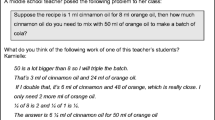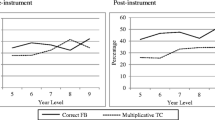Abstract.
This study describes the learning of researchers who engage in mathematics teacher education as an integral part of their practice. As teacher educators working with teachers on the subject of proportional reasoning, the authors reflected on teachers’ solutions to a standard problem and analyzed answers that would conventionally be considered incorrect. This exploration showed that some incorrect answers made sense, were based on problem situation analysis, and brought attention to the fact that conventional formal answers were given without much deliberation on their meaning in the situation. This insight prompted a second research phase in which teachers discussed and explained alternative solutions, and developed deeper analysis of problem situation in solutions that had been correct in the first place. The importance of making teachers aware of the nature of alternative solutions was further exhibited in a third research phase in which teachers evaluated children’s answers to the same problem. The pedagogical insight that emerged stressed the importance of making teachers aware of the tension between an almost automatic application of a mathematical model, and of analyzing problem situation during problem solving. In addition, the researchers developed better understanding of the mathematical challenge associated with the proportional reasoning problem, a stronger awareness of the role of sensitivity to their learners (the teachers), and of the role of reflection.
Similar content being viewed by others
References
T.P. Carpenter M.M. Lindquist W. Matthew E.A. Silver (1983) ArticleTitleResults of the third NAEP (National Assessment of Educational Progress) mathematics assessment: Secondary school Mathematics Teacher 76 652–659
P.W. Cheng K.J. Holyoak (1985) ArticleTitlePragmatic reasoning schemas Cognitive Psychology 17 391–416
T.C. Franco ParticleDe F.R. Curcio (1997) ArticleTitleA division problem with remainder embedded across two contexts: Children’s solutions in restrictive versus real-world settings Focus on Learning Problems in Mathematics 19 IssueID2 143–160
K. Gravemeijer (1997) ArticleTitleCommentary: Solving word problems: A case of modeling Learning and Instruction 7 IssueID4 389–397
B. Greer (1993) ArticleTitleThe mathematical modeling perspective on wor(l)d problems Journal of Mathematical Behavior 12 239–250
B. Greer (1997) ArticleTitleModelling reality in mathematics classrooms: The case of word problems Learning and Instruction 7 IssueID4 293–307
G. Hatano (1997) ArticleTitleCommentary: Cost and benefit of modeling activity Learning and Instruction 7 IssueID4 383–387
G. Hatano K. Inagaki (1998) Cultural contexts of schooling revisited: A review of the learning gap from a cultural psychology perspective S. Paris H. Wellman (Eds) Global prospects for education: Development, culture, and schooling American Psychological Association Washington, DC 79–104
B. Jaworski (1994) Investigating mathematics teaching: A constructivist enquiry The Falmer Press London
B. Jaworski (1999) The plurality of knowledge growth in mathematics teaching B. Jaworski T. Wood A.J. Dawson (Eds) Mathematics teacher education: Critical international perspectives Falmer Press London
B. Jaworski (2001) Developing mathematics teaching: Teachers, teacher educators, and researchers as co-learners F.-L. Lin T.J. Cooney (Eds) Making sense of mathematics teacher education Kluwer Academic Publishers Netherlands 295–320
M. Lampert (2001) Teaching problems and the problems of teaching. Yale University Press New Haven, CT
S. Lerman (2001) A review of research perspectives on mathematics teacher education F.-L. Lin T.J. Cooney (Eds) Making sense of mathematics teacher education Kluwer Academic Publishers Netherlands 33–52
J. Mason (1998) ArticleTitleEnabling teachers to be real teachers: Necessary levels of awareness and structure of attention Journal of Mathematics Teacher Education 1 IssueID3 243–267
National Council of Teachers of Mathematics. (1989). Curriculum and evaluation standards for school mathematics, Reston, VA: NCTM.
P. Nesher (1980) ArticleTitleThe stereotyped nature of school world problems For the Learning of Mathematics 1 IssueID1 41–48
K. Reusser R. Stebler (1997) ArticleTitleEvery word problem has a solution–The social rationality of mathematical modeling in schools Learning and Instruction 7 IssueID4 309–327
T.A. Romberg J.J. Kaput (1999) Mathematics worth teaching, mathematics worth learning E. Fennema T.A. Romberg (Eds) Mathematics classrooms that promote understanding Lawrence Erlbaum Associates NJ 3–17
D.A. Schön (1983) The reflective practitioner: How professionals think in action Basic Books New York
A.E. Silver J.L. Shapiro A. Deutsch (1993) ArticleTitleSense making and the solution of division problems involving remainders: An examination of middle school students’ solution processes and their interpretations of solutions Journal for Research in Mathematics Education 24 117–135
H. Steinbring (1998) ArticleTitleElements of epistemological knowledge for mathematics teachers Journal of Mathematics Teacher Education 1 IssueID2 157–189
L. Verschaffel E. Corte ParticleDe (1997) ArticleTitleTeaching realistic mathematical modeling in the elementary school: A teaching experiment with fifth graders Journal for Research in Mathematics Education 28 IssueID5 577–601
L. Verschaffel E. Corte ParticleDe I. Borghart (1997) ArticleTitlePre-service teachers’ conceptions and beliefs about the role of real-world knowledge in mathematical modeling of school word problems Learning and Instruction 7 IssueID4 339–359
L. Verschaffel B. Greer E. Corte ParticleDe (2002) Everyday knowledge and mathematical modeling of school word problems K. Gravemeijer R. Lehrer B. van Oers L. Verschaffel (Eds) Symbolizing, modeling and tool use in mathematics education Kluwer Academic Publishers The Netherlands 257–276
H. Yoshida L. Verschaffel E. Corte ParticleDe (1997) ArticleTitleRealistic considerations in solving problematic word problems: Do Japanese and Belgian children have the same difficulties Learning and Instruction 7 IssueID4 329–338
O. Zaslavsky R. Leikin (2004) ArticleTitleProfessional development of mathematics teacher educators: Growth through practice Journal of Mathematics Teacher Education 7 5–32
O. Zaslavsky O. Chapman R. Leikin (2003) Professional Development in Mathematics Education: Trends and Tasks A.J. Bishop M.A. Clements C. Keitel J. Kilpatrick F.K.S. Leung (Eds) Second International Handbook of Mathematics Education Kluwer Academic Publishers Dordrecht, The Netherlands 877–917
Author information
Authors and Affiliations
Corresponding author
Rights and permissions
About this article
Cite this article
Peled, I., Hershkovitz, S. evolving research of mathematics teacher educators: the case of non-standard issues in solving standard problems. J Math Teacher Educ 7, 299–327 (2004). https://doi.org/10.1007/s10857-004-1786-0
Issue Date:
DOI: https://doi.org/10.1007/s10857-004-1786-0




